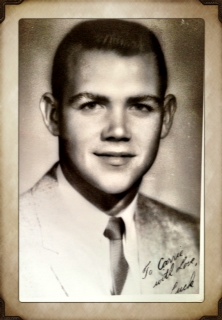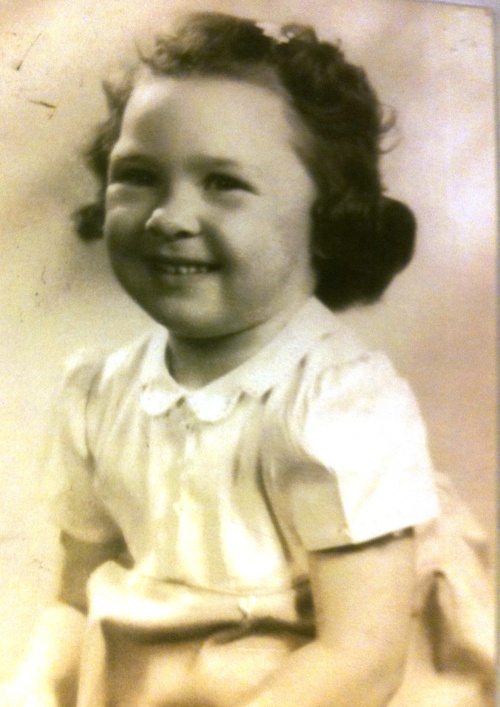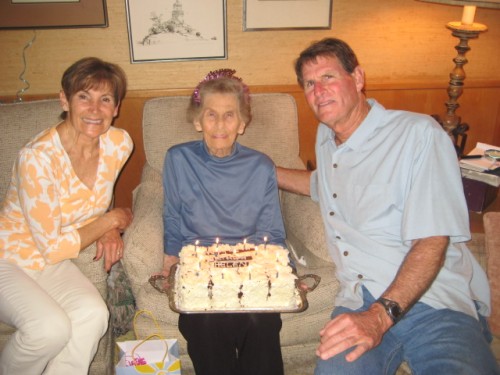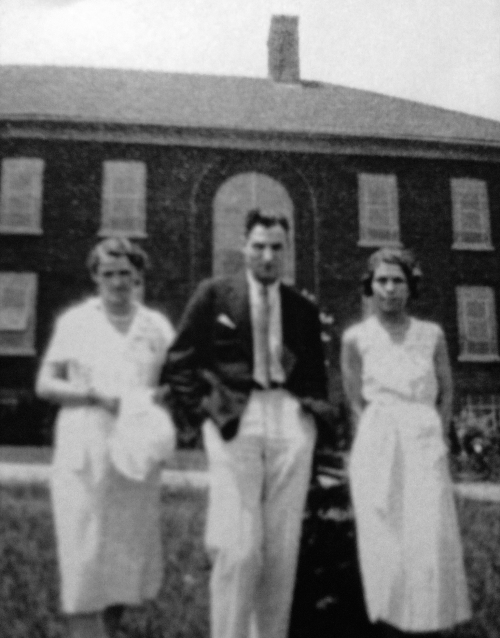Well hello my friends.
It’s been a sad couple of days, because Friday afternoon my Grandma Helen passed away. She died peacefully in her home as she had wished, less than a month before her 99th birthday. During her long life, Helen endured many difficult days, but she always maintained a positive outlook and a cheerful attitude. She inspired many with her engaging personality, keen intelligence, and caring love for family and friends. She will be greatly missed. I am so grateful to have had her in my life for fifty-one so many years, and in her honor I am posting this three-part story about her life, which may remind you of a story I posted here a couple of years ago. I was lucky to spend some time with Grandma in her later years, and wrote this series after several interviews with her.
Rest in Peace, my dear Grandma Helen.
Helen Norman, March 11, 1913 – February 17, 2012.
“Cheri, we’re wondering if you can come to San Diego in the Fall for a week,” my Uncle Steve said one July afternoon in 2010. “Susan and I will be out-of-town in October and it would be great if you could be here to check on Grandma.”
I was happy to help. Grandma was 97, and though her arthritis made it difficult for her to care for herself, she wanted to continue living in her home. So Uncle Steve and his wife Susan graciously cared for Grandma– they drove to her house every day to make her meals, help her shower, change her bedding and keep her company– and they had done this for several years now.
“And if you get around to it, there’s a box of old pictures in the spare bedroom closet,” Uncle Steve said. “You and she could go through it if you like.”
I liked his suggestion. I loved organizing, and I also wanted to learn more about Grandma’s life. The pictures might trigger some memories. She rarely talked about her childhood, but lately Grandma was opening up more. I tried to ignore my next thought: I can talk to her before it’s too late.
“That sounds great, Uncle Steve,” I said. It’ll give us something to do together.”
In October I walked into Grandma Helen’s family room. She was lying on the sofa, wearing one of her five navy blue flannel robes. A blanket covered her legs.
“Hi Grandma,” I said, leaning down to give her a kiss.
The room was dark, so I opened the vertical blinds at the sliding glass door, and pulled on the lever to the one-inch slatted window shutters to let in some light.
“It’s a pretty day.” I said.
Sunshine entered the room and I looked around.
The family room looked just as I remembered from countless visits over the years. It never changed. Grandma Helen and Grandpa Clyde had moved into the house in 1960– the same year I was born. The furnishings were like a time capsule from fifty years ago: lime-green shag carpet, woven wallpaper, huge table lamps with large cylinder lampshades, and a nubby tweed sofa.
Funny, I thought. Since Mad Men had revived an interest in all things ‘sixties, the room would have a current vibe if the furnishings weren’t so worn.
“How about some poached eggs?” I asked Grandma.
“That sounds good, honey.”
I made poached eggs with spinach and toast, two for each of us, and placed the plates on the coffee table in front of the sofa next to Grandma. She called the sofa a “Davenport.” In the past few years the Davenport had become Grandma’s bed because she liked being in the center of the house with the television and telephone nearby.
“Grandma, we’re going to go through some pictures,” I said after she’d eaten a few bites of the eggs and toast.
“Okay Honey,” she said.
Grandma was particular about a lot of things; she liked two pillows, her meals home-cooked, and a splash of brandy in her Ensure.
But for some reason she was easy-going about the pictures.
I retrieved the cardboard box from the back bedroom closet, and carried it to the family room. I plopped it beside us and pulled out the top picture.
“It’s been so long I don’t think I can remember who’s who,” she said.
“You’ll remember, Grandma,” I assured her. “I bet the memories will come flooding back.”
The Early Years
The picture was of a young woman holding a child.
“Who is this?” I asked.
“That’s me and my mother,” she replied. “Her name was Elsie Marie Johnson before she married my dad, Homer Lowry. That picture was probably taken the day I was baptized in 1913, because it looks like I’m wearing a white baptism outfit.”
“Your mom was pretty, Grandma, and she looks like she was nice.”
“Yes, she was.”
“Do you know why you were given the name Helen?” I asked.
“I have no idea why my parents named me Helen,” she said. “But Mom named me Isabelle after a good friend of hers.”

Helen and her mother, Elsie Marie Johnson Lowry, in 1913 on Helen’s Baptism Day
“Do you know what your heritage is?” I asked.
“My mother was Swedish, and my father was Irish,” she said. “My grandfather, Frank Lowry, came from Ireland in the 1800’s to start a farm.”
“Do you know why he left Ireland?”
“I’m not exactly sure, but it had to do with the potato famine,” she said. “There were lots of problems in Ireland, so my grandfather had to leave the country. But he had no money, so he came to the United States in the boat’s steerage section.”
No Family or Friends
“Tell me about your family,” I said.
“I don’t remember any extended family members living nearby, as our home was quite isolated,” she said. “The nearest neighbor was five miles away. I didn’t have any childhood friends, so I looked forward to the two weeks out of the year when my mother’s relatives came to visit. I loved my mother’s family,” she said. “It was always so much fun to play with my cousins, too.”
Sisters Pauline and Margaret
“What were your sisters like?” I asked.
“I spent all my free time with my sisters Margaret and Pauline. Margaret was four years younger, and Pauline was six years younger. We lived on a 150 acre farm in Byesville, Ohio. Woods surrounded the farm, which we loved to explore. We climbed trees all day long and nobody ever worried where we were. It was so different from today, with parents hovering over their children all the time.”
Grandma lowered her voice to a whisper, like she was telling me a secret. “Growing up it wasn’t much fun playing with Margaret,” Grandma said. “Margaret was a heavy child, and she couldn’t run very fast or climb trees. The only way she could climb a tree was if I pushed her up,” she sighed. “Her heaviness was a big problem, because climbing trees was all we did.”
Grandma looked at me. “But things changed,” she continued. “For the rest of our lives, I got heavier and Margaret got thinner.”
We laughed. “Payback’s a bitch, huh Grandma?” I patted my thick thigh and winked.
Grandma’s head bobbed up and down and her piercing blue eyes crinkled. Hearing her laugh made me laugh more. This was fun!

Helen, Pauline, and Margaret with their dad, Homer
The House
“What was your house like?” I asked.
“There were no bathrooms in the house, and we had to go outside to use the privy,” she said. “We used the Sears Roebuck and Montgomery Ward catalogs as toilet paper in the outhouse. The catalog paper felt slick. I hated to go in the middle of the night. If you didn’t want to go outside to the privy you had to keep a pot in your room.”
“Did you have electricity?” I asked.
“No. There were no telephones or electricity, only oil lamps. We had an organ, though. My mother knew how to play well, and my little sister Margaret could play too. And the sitting room had a pot-bellied stove in it.”
“What else did you do to pass the time?” I asked.
“We would sit with our grandfather on the big porch surrounding the house and look at the clouds. My grandfather was nice,” she said. “He had an understanding of kids, and he would tell us stories of his childhood.”
She continued her musings about those evenings on the porch. “And we would catch lightning bugs. I’d put mine in a jar so they’d light up my room.”
“Hmm,” I murmured, thinking how I loved catching lightning bugs as a kid too, when we lived in Virginia.
“The lightning bugs were my electricity,” she said. “That was my entertainment.”
Getting into Mischief
“What kind of mischief did you get into, Grandma?” I asked.
“Cheri!” Grandma gave me a long look. “I don’t know if I should tell you about that. Plus, do you know how long ago that was?”
I smiled my most charming smile. Grandma gave me a defeated look. I waited, and soon she began to talk again.
“My sisters and I used to tease a bull. We would wave something red in front of him to make him charge us,” she laughed. “He would run toward us and I remember running away as fast as I could to jump over the fence and save ourselves from getting killed.”
“My God, Grandma! I’m glad I was not your mother!”
“My mother had no idea what we were up to, Cheri,” she said.
“Did you ever get punished?” I asked.
“Always, but it was my father who punished me. I got a lot of switchings.”
“Really?” I found this interesting, because Grandma didn’t seem like the trouble-maker type. “Tell me about that.”
“My father would yell, ‘Go pick the finest little branch you can find, and come back in here!’ So I would go outside and find a branch, and go back inside to get my switching.”
“How awful, Grandma.”
“Yes, and it hurt. Those tiny branches would leave little welts,” she said.
“What did you do to deserve such punishment?”
“Most of the time it was because I tore my bloomers.”
“Really?” This shocked me. “What a trivial thing to get punished for. What did the bloomers look like?”
“They were big, black, billowy things—just horrid!”
Toys and Things
I moved the subject away from Grandma Helen’s father, because she didn’t seem to want to talk about him anymore.
“Did you have any toys or things growing up?” I asked.
“I didn’t have many material things. I never had a sled or a bicycle, but I didn’t mind,” she said. “There was no place to ride them anyway.”
But she did remember one toy.
“One year for Christmas I got a doll that my mother made,” she smiled at me. “I loved that doll.”
I smiled at her. “Was that the only gift you got at Christmas?” I asked.
“Yes,” she said. “And I was happy. And the next Christmas, my mother sewed clothes for that doll.”
“Your only gift?” I asked.
“Of course!” Grandma replied, shocked I asked. “My mom was a really good seamstress.”
“Tell me more about your mom,” I said.
“She had the tiniest waist, and my sisters and I would try on her clothes in the trunk in her bedroom,” Grandma said. “And we loved to brush her hair, which was long and wavy.”
She paused, thinking about something. She was frowning.
“Go on, Grandma,” I said softly.
“Sometimes my father would say, ‘why don’t you brush my hair?’”
“What did you do?” I asked.
“We refused,” she said. “Nobody ever wanted to brush his hair.”
And that was the end of that subject.
The Animals
I took a drink of the diet coke I had found in Grandma’s garage refrigerator, then lifted up the glass of cranberry juice I had placed on the table and put it near Grandma’s chin. She pulled the straw into her mouth and took a long drink. The years of golfing in the sun had taken its toll; age spots covered her face and hands and a yellow cast colored her fingernails. But her mind was sharp and she showed no signs of wanting to stop talking, so I asked another question.
“Did you have any pets?”
“No. But we had nameless dogs and cats that roamed the farm. There were gobs of cats. And there were little kittens everywhere. There were so many cats they became a problem, and we had to get rid of them,” her eyes filled with tears.
“What’s the matter, Grandma?” I asked.
“To this day I resent my dad because he would drown the cats,” she said. “But in some way, I understood it. Nobody wanted the kittens. And it was over pretty fast when my father put them inside the rain barrel.”
Chores
I pictured Grandma’s father drowning helpless little kittens, and felt sick.
I tried to change the subject. “Did you do any chores?”
“Of course. My primary chore was to tend the chickens. I had to feed them and take care of them.”
She paused and turned to me.
“The funny thing is, my dad would bring the chicks into the house, so they wouldn’t get cold and die.”
I thought about that. “That’s interesting,” I said. “Why did he save the chicks but not the kittens?”
“Because they were part of the food chain.”
“Hmm,” I nodded, in understanding. “So what other chores did you do?”
“My dad would send me to get the mail, usually at dusk. The mailbox was a mile away, and I would run through the woods, which was terribly frightening. My family said they could hear me screaming the entire time I was gone. The woods were scary at night. There were all these noises!”
“Oh Grandma, how awful!”
“Yes, and to this day, I have a fear of the dark, perhaps because of those scary runs to the post box.”
Allowance, Church, School and Birthdays
Gosh, I thought. Grandma had some pretty awful memories about her father, but she never talked about any of this when we were kids. Why was she talking so openly now? I knew the answer, but pushed it back, choosing instead to think of more questions to ask her. I needed to keep Grandma talking.
“Did you receive an allowance?” I asked.
“Never.” she said. “I don’t know what I would have done with money anyway; we were miles away from everything.”
“How about church?” I said.
“Occasionally, on Sundays, we would dress up and go to the Presbyterian Church, ten miles away. But we didn’t go often because it was a big chore hitching up the horse and buggy.”
“What was school like?” I asked. We were on a roll.
“We really did have to walk five miles to school and back,” she said. “It was a little country school, eight grades in the same room. I learned a lot from the upper classes– when I was in the lower grades I listened as the teacher taught the upper grades. I did well in school. Reading was my favorite subject.
I looked around at the stacks of magazines and books and newspapers in neat piles around the room. “That makes sense, Grandma, because you are the most well informed person I know.”
Grandma waited for me to ask another question. She was enjoying this.
“So, how did you celebrate birthdays?” I asked.
“I don’t remember ever celebrating a birthday when I was a kid. Our family usually ate dinner together at a big oblong table. When I was nine, my mother was just starting to teach me how to cook a few things.”
I was curious to hear more about my Great Grandmother, but I had been there several hours and Grandma needed some rest.
“Wow Grandma, you did a good job remembering so much,” I said. “Let’s see. All this happened in the early 1920s. You’re memories are ninety years old!”
“I guess my mind is still okay.”
“Yes, Grandma, it is. And you also did good eating your eggs.”
I helped her to the bathroom, and while she was up I changed the sheet on the Davenport. I walked her back to the family room, got her settled, and gave her a kiss.
“I’ll have more questions for you tomorrow, Grandma.”
“Okay honey,” she said. “Sweetheart, before you go, can you turn on the patio light?”
I looked out the patio door and saw it was dark outside now. I had almost forgotten; Grandma always liked the back light on because she was afraid of the dark. I flipped on the switch, put the wood pole in the sliding glass door track, gave her another kiss, and drove back to Uncle Steve and Aunt Susan’s house, where I was staying for the week.
Coming Up Next: The Tragedy that Changed Helen’s Life





















